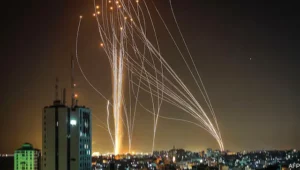The recent flare-up between Hamas and Israel’s IDF and how it plays out shows what AI has done to warfare. The effect on the ground may not seem that different. However, how Israel is managing its campaign shows just how crucial a weapon AI has become outside the battlefield.

After Hamas launched an all-out attack on Israel, the IDF responded with all its might in what can only be described as one of the most recent brutal military campaigns in Gaza. While at least 900 people have died in Israel, over 2,500 injured, and several hundred abducted, over 1,00,000 people have been displaced in Gaza, with about 700 killed.
While Hamas’s attack is seen as a massive failure for Mossad, one cannot deny that had Israel not incorporated AI in its military doctrine, the attack over the weekend would have been far deadlier.
Here’s how Israel has been using AI to deter and retaliate against Hamas
Israel’s Iron Dome
The Iron Dome, a defense system that uses radar technology, was primarily designed to intercept short-range rockets and mortars targeted at Israel. Its operation involves the utilization of predictive analytics and machine learning to identify and neutralize incoming projectiles. The system can detect an incoming rocket from distances of up to 70 kilometers by considering various factors such as speed, weather conditions, and the projectile’s size to calculate its trajectory and potential point of impact accurately.
Upon gathering this critical data, the control center carefully analyzes it and, when necessary, deploys a counter-missile to intercept and eliminate the enemy rocket threat. If the system determines that a rocket is headed toward an unpopulated area with little or no damage, it may opt not to engage.
Israel reported that Hamas had fired at least 3,000 rockets during the attack on Saturday. The IDF said that their Iron Dome air defense system effectively intercepted nearly 90 percent of these rockets, leading to minimal to no damage.
However, Hamas insists that they launched over 5,000 rockets and claimed that each one had successfully hit its target. This discrepancy in the number of missiles fired and their purported accuracy underscores the multifaceted nature of the ongoing conflict and the divergent narratives of the parties involved.
Fire Factory: AI for logistics
IDF has also incorporated AI into its military operations to improve logistical organization during conflict and expedite decision-making processes. Israel is also using AI to improve target selection.
The IDF also uses an AI called ‘Fire Factory’ to coordinate raids and logistics rapidly. Fire Factory used target-related data to calculate the required ammunition loads, allocate targets to fighter jets and military drones, and generate a schedule, which saves a ton of time and, more importantly, lives. In these cases, the AI systems merely make suggestions; the final decision is still with a human.
Using AI to takedown launchpads and weapon shipments
Since 2021, Israel has been using AI to identify rocket launchpads and deploy drone swarms, marking a significant advancement in their military capabilities. Furthermore, the IDF has used AI to analyze satellite imagery, enabling more efficient and accurate intelligence gathering.
The IDF has also used AI to conduct successful raids on weapon shipments destined for Iran-backed militants, such as Hezbollah in Syria and Lebanon.
Blue Wolf, the ‘Facebook for Hamas Terrorists’
Israel has used facial recognition technology for about two years in a “Blue Wolf” operation. It is aimed at safeguarding the nation against potential terrorist threats.
Reports have suggested that the Israeli military has accumulated a vast database of facial images, likened to a secretive “Facebook for Palestinians” by a former soldier, as reported by The Washington Post.
According to the head of Israel’s defense ministry, Israel is determined to become a powerhouse in artificial intelligence. They’re setting their sights on boosting their capabilities in autonomous warfare and making smarter decisions in combat.
Retired army general Eyal Zamir echoed this sentiment at the Herzliya Conference, an annual global security gathering, pointing out that many believe AI is poised to revolutionize how battles are fought on the frontlines.









